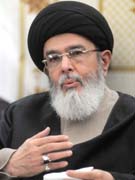|
|
|
|
|
|
||
| Released by Qamar Zaidi spokesman TNFJ ; Translated by S M Naqvi | ||
|
RAWALPINDI, March 15: The Tehreek Nafaz Fiqh-e-Jafariya Pakistan has demanded from the government to give right of leadership of Islamic Council of Ideology and other important government and religious institutions to all recognised schools of thought, turn by turn. Moreover, representatives approved by the makatib and not the hand-picked persons should be included in these institutions. These views were expressed in a resolution adopted in the concluding session of the High level meeting of TNFJ office-bearers and heads of subordinate bodies here on Monday. Additional Secretary General Syed Shujjat Ali Bukhari presided over the session. According to Central Spokesman of the Tehreek, Syed Qamar Haider Zaidi, the participants of the meeting, through a resolution, expressed that in the Pakistanís Constitution, it is necessary for the President, Prime Minister, Speaker National Assembly, and Chairman Senate to be a Muslim. That is why, people belonging to different recognised schools of thought had been appointed to these offices, from time to time. But unfortunately, in the religious organisations including Islamic Ideology Council, set up for Islamisation, Maktab e Tasheyyo has never been given leadership of any of these organisations to-date. Therefore, the resolution said, the Chief Justice should take suo moto notice of this excess and norms of justice and fair-play should be fulfilled in this regard. The resolution said that there are at least eight and maximum 20 members of the Islamic Council of Ideology, therefore ten members belonging to the Maktab e Tasheyyo should be included in it and five Shia representatives should be there as compared with Makatib. The resolution said that Maktab e Tasheyyo and Ahl e Tasannun should be given representation in Islamic Ideology Council, Ruet e Hilal Committee and other organisations. Another resolution made it clear that protest enjoys the basic right for achievement of rights and protection in Muslim and non-Muslim States throughout the world the fresh example of which is current wave of protests in Kirghizstan, Tunis, Oman, Bahrain, Libya and Algiers. Strongly condemning the verdicts issued by brotherly Islamic State Saudi Arabiaís Muftian declaring peopleís protest Haram, the resolution declared the acts of putting innocent citizens in jail and violence against them commensurate with pressing their voice and a violation of Islamic principles. The resolution asked from the Muftian that what is the status of Malookiyyat in line with Quran and Hadees in Islam? The resolution said oppression, anywhere in the world, is condemnable, and rulers of the Muslim States should keep in mind that submissive attitude towards colonial powers is against Quranic teachings, therefore, they would have to get rid of international colonial powers for solution of problems and an end to the difficulties faced by the Islamic World. Otherwise, they would have to wait for their turn, one by one. The resolution expressing concern over the continued terrorism in the country, particularly the new wave of target killing in economic city of Karachi, termed it the condemnable work of enemies of the religion and the motherland. The resolution demanded from the government to move the anti-terrorism law into action and culprits of all incidents should be given exemplary punishment as these incidents are heinous conspiracy against the motherland. The resolution also demanded to set up a high level tribunal comprising non-controversial judges to probe the incidents of terrorism. The resolution prayed for all those Shuhada who lost their lives in terrorism, and particularly the renowned TNFJ leader Syed Najam Abbas Kazmi who passed away recently. Another resolution expressed concern over the ongoing tussle between different institutions saying that justice and fair-play, and impartiality should be visible through character and deeds as this is not the time for confrontation but peace and tranquillity. The resolution made it clear that if the government could not restore law and order then it has no justification to remain in power. The resolution called upon the government and the opposition not to make the banned groups sit in their laps and media should also avoid giving coverage to them. The resolution called upon the Islamic World to make their decisions themselves because America is not a friend of anyone but pursues her own interests. Another resolution strongly condemned continued oppression in Palestine and Kashmir and called upon all organisations including the United Nations to play their role in stopping the Israeli and Indian aggression, oppression and brutality. The resolution demanded solution of long-standing issues of Kashmir and Palestine in line with the United Nations Resolution keeping to the desire of the respective people. The resolution demanded immediate exit of allied forces from Afghanistan and Iraq. Yet another resolution demanded of the government to ensure implementation of May 21, 1985 Junejo-Moosavi agreement for solution of problems faced by the Maktab-e-Tasheyyo. |
||
|
|
||



